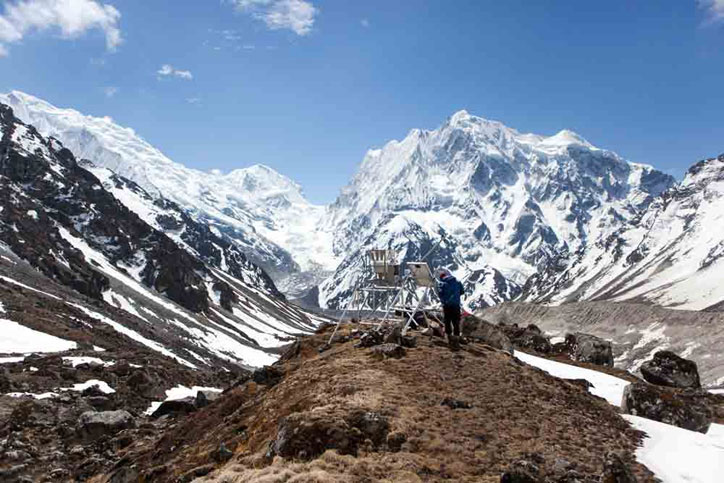 New Delhi:
New Delhi: Renewable energy, plus the efficient use of energy, can reduce the devastating impact of climate change and the Himalayan region should be at the centre of all green negotiations as the hill people contribute the least to global warming but suffer the most, a leading international expert has said.
"We know that burning oil and coal is a big culprit. Renewable energy, plus efficient use of energy, has a lot of scope to reduce the problem, but we have to get more serious about it than we are now," David James Molden, the head of the Kathmandu-based ICIMOD, told IANS in an email exchange as the 22nd meeting of the UN Framework Convention on Climate Change begins going into its business end at Marrakech, Morocco.
"Yes, all of us need to do everything we can to take mitigation measures against climate change."
The ICIMOD (International Centre for Integrated Mountain Development) is implementing the Climate Smart Village programme under the Himalayan Climate Change Adaption Programme.
Advocating strong global action to counter the devastating impact of climate change on natural water resources, especially in the Hindu Kush Himalayan region that is home to 210 million people, he urged the global leaders to support adaptation measures in the mountains.
"Mountain people contribute very little to the causes of climate change, yet they bear the brunt of the change. It's the responsibility of the global community to recognise this situation, and provide support to the people of the Hindu Kush Himalaya," he said.
Molden's assertions are crucial in the context of Republican Donald Trump's victory in the US presidential election in what is being seen as a big setback for renewable energy sources that have been promoted by the outgoing Barack Obama administration.
Molden believed water to be considered as a main climate change challenge at Marrakech.
"For adaptation, water is key. Climate change manifests itself in the mountains through increasing temperatures and changing precipitation patterns. These factors lead to changes in ecosystems, farming systems and river systems."
"As glaciers melt, as snowfall patterns change, people will have to adapt to a different hydrology of water and river systems. Moreover, it is likely that hazards from floods and droughts will increase as well. So, better management of water is central to any adaptation response in the mountains," Molden said.
The Hindu Kush Himalayas are the source of 10 major river basins, providing water to over 1.3 billion people -- more than the entire continent of Europe -- many of whom live in areas where water scarcity is already a concern.
Add to this the prospect of changing river flows and more floods and droughts.
"This is a major concern, and certainly a major challenge that needs to be addressed by (the Marrakech) COP 22," said Molden, who has a wide experience in Hindu Kush Himalayan river basins, including in India, China, Nepal and Pakistan.
A climate and water atlas of ICIMOD, GRID-Arendal, a Norwegian Foundation, and the Centre for International Climate and Environmental Research-Oslo says temperatures across the Hindu Kush Himalayas will increase by about one to two degrees Celsius, and in some places by four to five degrees, over the next 35 years.
At the COP21 in Paris last year, the governments agreed to "hold the increase in the global average temperature to well below two degrees Celsius above pre-industrial levels and pursue efforts to limit the temperature increase to 1.5 degrees".
"If we are able to hold the world to a two degree average temperature rise, we are likely to see much higher temperatures in the mountains with consequences of melting snow, glaciers and permafrost. So, the story is not good for mountain people," Molden contended.
On the Himalayan region that will be the centre of all negotiations on climate change, he replied: "Yes, I think it should be the centre of global negotiations, but unfortunately it remains on the periphery. Mountain countries need to come together more and express their collective concerns, much like the island states have done."
In a message to the global leaders, he said: "There is an urgent need to support adaptation measures in mountain areas. Please move as quickly as possible to take action to curtail rising temperatures."
The Paris Agreement, he said, was an important milestone. Now the important part is to turn the words and intentions into actions. "Hopefully, Marrakech will strengthen the resolve."
However, an optimistic Molden said there is scope for developing countries to leapfrog in their energy strategies that can provide local benefits while also contributing to climate change mitigation.
"People who emit more have an obligation to provide assistance to those who suffer disproportionately," he said.
The 22nd session of the Conference of the Parties and the 12th session of the Conference of the Parties to the Kyoto Protocol (CMP 12) are scheduled to be held in Bab Ighli in Marrakech till November 17.
 New Delhi: Renewable energy, plus the efficient use of energy, can reduce the devastating impact of climate change and the Himalayan region should be at the centre of all green negotiations as the hill people contribute the least to global warming but suffer the most, a leading international expert has said.
New Delhi: Renewable energy, plus the efficient use of energy, can reduce the devastating impact of climate change and the Himalayan region should be at the centre of all green negotiations as the hill people contribute the least to global warming but suffer the most, a leading international expert has said.